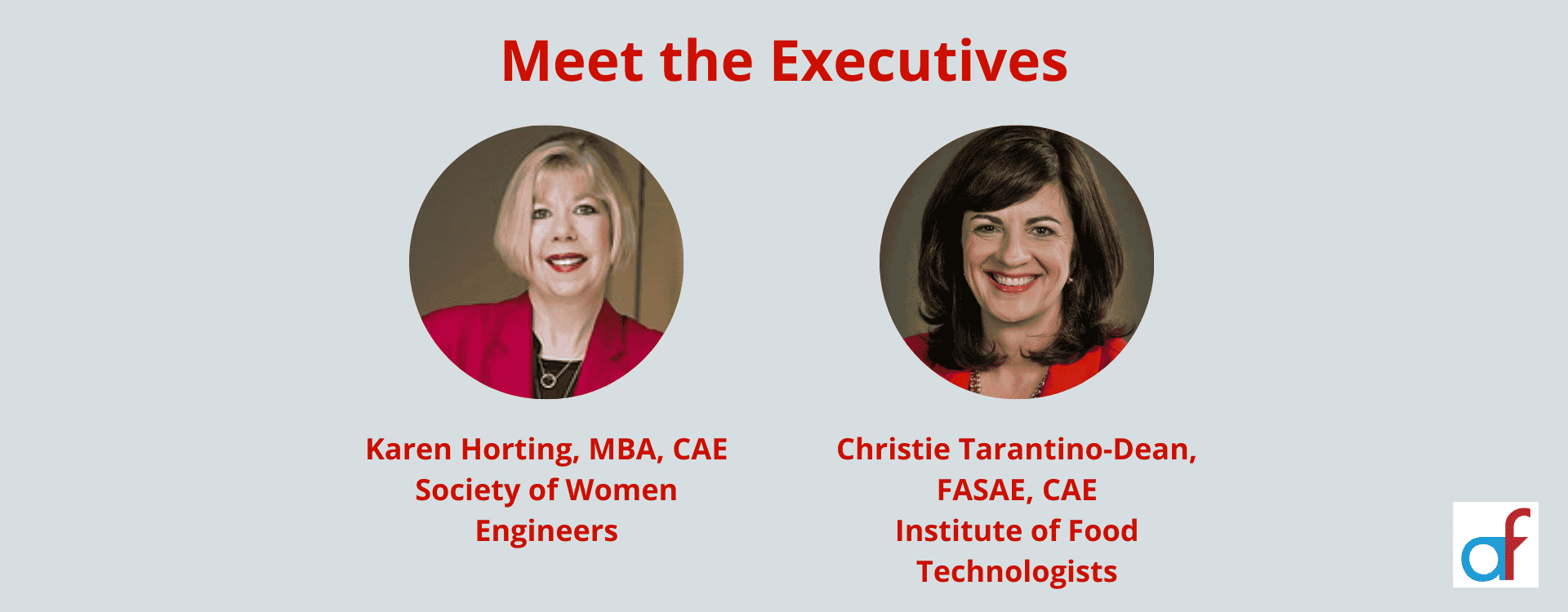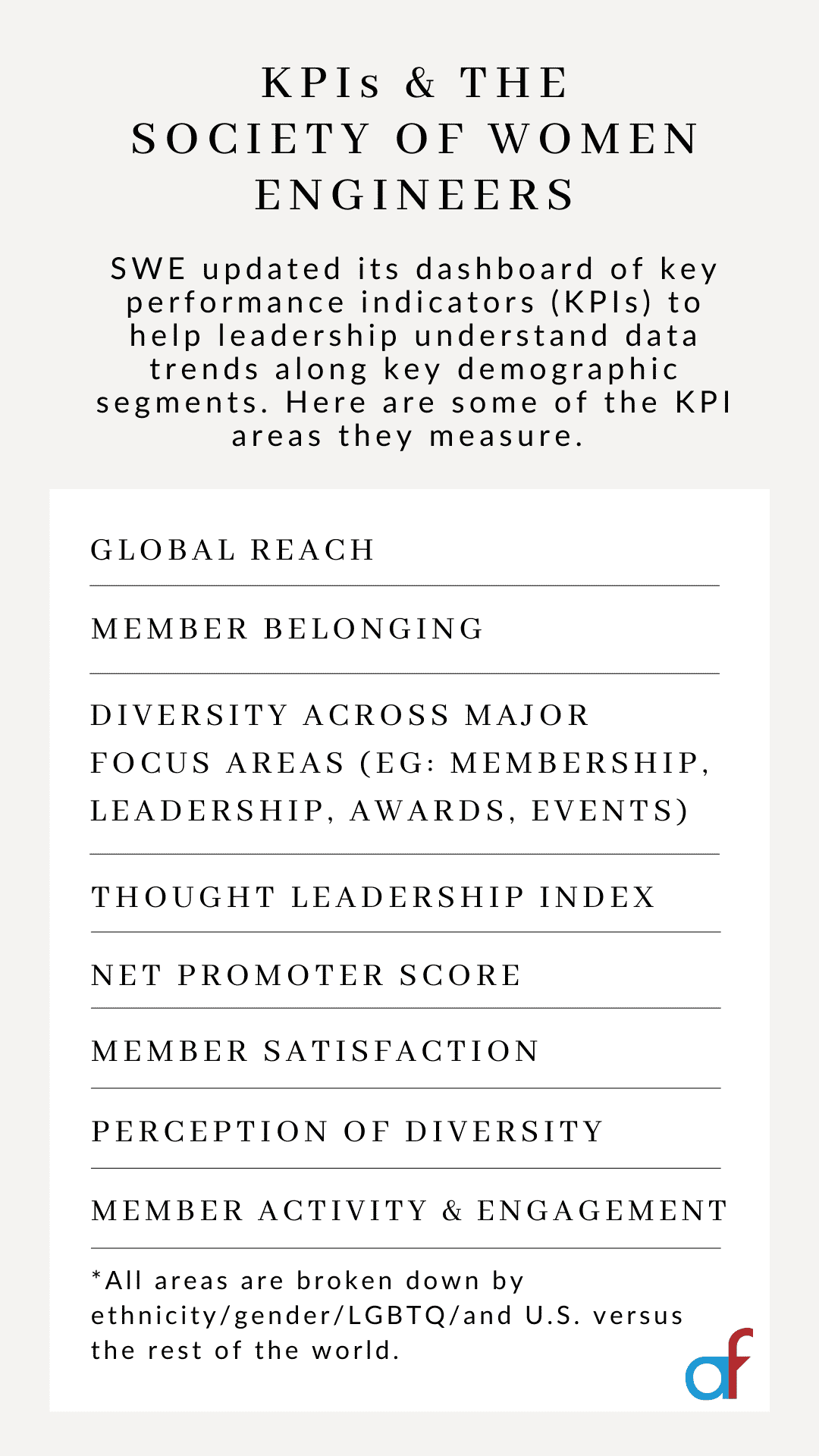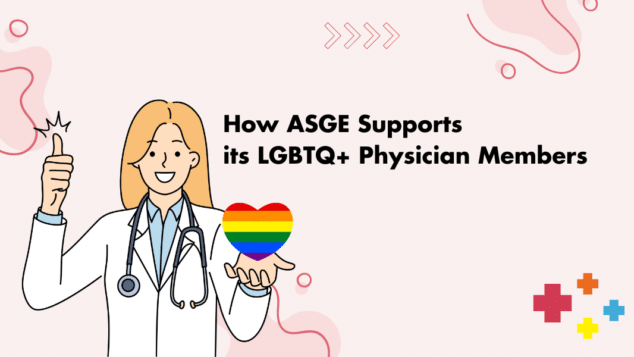Leading with Inclusive Governance

Associations escalate their mission impact by creating welcoming and inclusive environments, and governance is a key component of that effort. Inclusivity champions and Chicago association leaders Karen Horting, MBA, CAE, Executive Director and CEO, Society of Women Engineers (SWE) and Christie Tarantino-Dean, FASAE, CAE, Chief Executive Officer, Institute of Food Technologists (IFT) share their perspectives on inclusive governance and discuss the strategies they have implemented to bring about meaningful change.
Both SWE and IFT can be characterized as fairly mature in their inclusivity journeys. The Society of Women Engineers was founded upon principles of inclusivity, and the Institute of Food Technologists is the recipient of Association Forum’s 2020 Welcoming Environment Organizational Award.
What does inclusive governance mean to you?
Christie Tarantino-Dean: Inclusive governance starts with a board that is diverse in their background, skills, experiences, job functions and expertise. You also have to be sure that there is a strong board-staff partnership and a culture where constructive conflict is encouraged. Intentionally designing board meetings to address different style preferences and encouraging robust and crucial conversations results in inclusive governance. We continuously strive to provide an environment where everyone feels their time is well spent and they are contributing to the overall success of the organization.
Karen Horting: For SWE, inclusive governance ensures our structures, systems and approaches are inclusive for all and enable our DEI&B (diversity, equity, inclusion, and belonging) objectives. We want to make sure that our leadership, award recipients, scholarships recipients, programs and speakers reflect the diversity of our membership. As a diverse society, we strive to lead by our actions and deeds to ensure our members experience our values and feel a sense of belonging within the Society.
What strategies have you implemented (or are implementing) to be more inclusive in your governance practices? How did you determine which strategies to prioritize?
Karen Horting: We worked with McKinley Advisors to gather member and stakeholder perspectives on SWE’s governance approaches and our current state relative to diversity, equity inclusion, and belonging. This work led to several recommendations that the SWE Board reviewed and prioritized, such as conducting an internal culture study to understand how our members are experiencing the SWE culture and if their experience is different from our espoused values. We have established communication goals for our DEI&B activities to add more transparency about our work. Our DEI Program Manager is leading specific initiatives at the staff and volunteer level around gathering and maintaining data, conducting ongoing focus groups, and regularly communicating our efforts.
Christie Tarantino-Dean: We have spent a lot of time looking at systems and addressing where they aren’t truly inclusive. We’ve changed how we select our board, how we appoint committees and task forces, and how we conduct our award selection processes. Prioritizing what to do first is always a challenge. We started with research to determine how our members were experiencing inclusion in our organization, and then moved to prioritize strategies based on that feedback. We still have work to do but doing it all at once isn’t an option and wouldn’t have been successful.
 What has this meant for how you structure, recruit, onboard, or operate boards, committees or other entities?
What has this meant for how you structure, recruit, onboard, or operate boards, committees or other entities?
Christie Tarantino-Dean: We have completely changed our board selection process. We’ve identified the basic requirements for new board members, and we meet annually as a board to identify what multi-dimensional factors will be needed in our next board class to best meet the strategic needs of the organization for the subsequent 3 years. This feedback is discussed by the entire board and then outlined to our Leadership Development Committee to consider in their selection of candidates for the slate. By implementing intentional processes, we just named our most diverse board class in almost every dimension of our membership. We continue to evaluate and learn what can be done better.
Karen Horting: I think this remains to be seen and is something we will continue to measure as part of our Key Performance Indicators (KPI) Metrics dashboard, which we updated significantly to better collect data to empower SWE leadership to understand data trends along key demographic segments. Ultimately, we want to see leadership at all levels of the Society that reflect the diversity of the engineering profession. I anticipate that over the next several years members will see significant changes to how we recruit, nominate, and select our leaders. This will create a more welcoming, inclusive community.
How have your members and volunteers responded to the changes?
Karen Horting: The reaction has been positive, but not enough members know about the work taking place. Communication is a focus of our efforts in the near future. Our goal is to ensure all members are aware of our commitment to DEI&B, our planned goals and supporting activities. We will communicate our DEI&B goals each year annually to report out on our work, which provides membership transparency and creates a culture of accountability.
Christie Tarantino-Dean: Overall, the response has been positive. IFT has members who have joined the organization as undergraduate students and have remained members throughout their entire career and well past retirement. We just celebrated the 100th birthday of one of our Past Presidents! As a result, there is a lot of history and emotional investment in the organization. Communicating “the why” was very important. By having more inclusive governance, we believe we can better serve our members.
How are you measuring success?
Christie Tarantino-Dean: This is something we need to continue to work on, but we have started with collecting information on who our members are. Prior to 2016, we didn’t collect extensive demographic data. We can now evaluate the makeup of our members vs volunteer appointments vs award winners, etc. As we continue to evolve, we’ll set more concrete measures of success.
Karen Horting: We measure success by evaluating the annual progress towards our specific DEI&B strategic goals and through tracking various diversity metrics in our KPI dashboard. We also value informal and formal input from our members, which we receive through our annual town hall, member surveys, and general open-door policy. To that end, our member town halls are a standing place for hearing the public voices of our members. We have added DEI&B questions to all our member surveys and event surveys. Sometimes critical and public feedback is a challenge to hear and accept, but we ensure these forums are available to help guide us as we seek to continually improve going forward.
What advice do you have for other association executives who are considering efforts to advance inclusive governance?
Karen Horting: It is worth the investment and critical to their long-term success! SWE does a lot of work with employers to educate them on the need to focus on systemic change in order to recruit, retain and advance their diverse talent. The same work is needed within the association industry; we must remove the bias from our systems and processes if we want truly inclusive thought leaders with diverse and vibrant communities.
Christie Tarantino-Dean: Timing is everything, and there is a right time for different aspects of this work. There is always work to be done, so start with research and build on that. When the consequential decisions are faced, you’ll have built a foundation that enables your staff and leaders to address them with courage.
Tags
Related Articles
ASGE’s Commitment to Supporting the LGBTQ+ Physicians in GI through Allyship and Education
Read about one association's efforts to pave the way for equity and inclusion for the...
How to Celebrate AAPI Heritage Month
Asian Americans have made tremendous contributions to the association industry and the diverse fabric of...
How to Celebrate Arab American Heritage Month
Whether you celebrate as an organization or an individual, April is a time to appreciate...



 What has this meant for how you structure, recruit, onboard, or operate boards, committees or other entities?
What has this meant for how you structure, recruit, onboard, or operate boards, committees or other entities?

